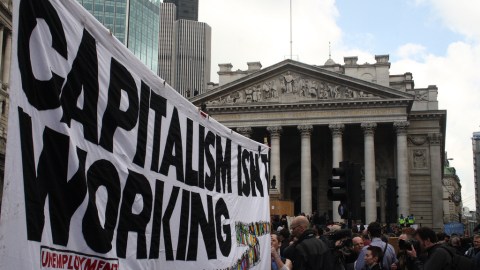Is there such a thing as an anarchist capitalist?

Jonny White via Flickr
- Seemingly diametrically opposed, some peopel call themselves anarcho-capitalists.
- Anarcho-capitalism argues that there ought to be no state whatsoever; the free market can sort everything out, and if left alone, will ensure everybody’s liberty.
- The philosophy attracts considerable criticism, both from anarchists and people with more traditional politics.
Though they come in many different forms, anarchists generally agree on a few broad principles. Typically, anarchists reject the idea of hierarchical authority and the state. Though religious anarchism exists, it’s not a typical expression of anarchism. And nearly all anarchists have an unabiding loathing for capitalism. This is so dyed in the anarchist wool that the 20th-century anarchist Emma Goldman once wrote:
“The only demand that property recognizes is its own gluttonous appetite for greater wealth, because wealth means power; the power to subdue, to crush, to exploit, the power to enslave, to outrage, to degrade. America is particularly boastful of her great power, her enormous national wealth. Poor America, of what avail is all her wealth, if the individuals comprising the nation are wretchedly poor? If they live in squalor, in filth, in crime, with hope and joy gone, a homeless, soilless army of human prey.”
As confident and purple as Goldman’s prose may be, however, there are indeed anarchists who do not reject capitalism outright; they call themselves anarcho-capitalists.
Most, especially Americans, are probably more familiar with the term ‘libertarianism‘, if not through politics then at least through Ron Swanson. The main difference between the two philosophies is that libertarians advocate for minimal government interference. Most libertarians believe there should be no government regulation, no state-owned property, no welfare, and so on, but they generally agree that there should be police, laws, and court systems. Anarcho-capitalists, on the other hand, argue that no state is necessary whatsoever (hence the “anarcho-” portion of their name); everything can be handled by the free market, and any issue with capitalism today is because of interference by the state in the free market.
Anarcho-capitalism and the non-aggression principle
The central idea that unites the two theories is known as “the non-aggression principle.” Murray Rothbard, one of anarcho-capitalism’s and libertarianism’s core thinkers, explains what a society that follows the non-aggression principle would look like in his essay, Society without a State:
I define anarchist society as one where there is no legal possibility for coercive aggression against the person or property of any individual. Anarchists oppose the State because it has its very being in such aggression, namely, the expropriation of private property through taxation, the coercive exclusion of other providers of defense service from its territory, and all of the other depredations and coercions that are built upon these twin foci of invasions of individual rights.
Anarcho-capitalists consider state interference, including regulation, prohibition, and so on, to be a kind of violence. Being threatened with imprisonment or fines for doing what one wants with one’s property is unacceptable to the anarcho-capitalist, whether they wish to sell food, their services, drugs, firearms, or whatever it is that they choose to do. The only limit is that it can’t be coercively aggressive, so slavery, for instance, is off the table.
This central principle is what anarcho-capitalists believe society should be oriented around. With no state, how would this principle be enforced? Well, it depends on who you ask. Some anarcho-capitalists believe there should be some central code that courts would pledge to follow when distributing justice. The economist David Friedman offers a very anarcho-capitalist solution to justice and the law: “[T]he systems of law will be produced for profit on the open market, just as books and bras are produced today. There could be competition among different brands of law, just as there is competition among different brands of cars.” Friedman himself admits this system could lead to some very peculiar legal structures, including some that would violate anarcho-capitalist and libertarian principles. Critics of this approach argue that any court verdict could easily be bought, while anarcho-capitalists argue that this would ruin the private court’s reputation, and therefore its ability to attract “customers.”
Criticism
Although Rothbard asserted that “capitalism is the fullest expression of anarchism, and anarchism is the fullest expression of capitalism,” plenty of anarchists disagree with him. Noam Chomsky, for example, might be as far away from an anarcho-capitalist as an anarchist could be. Chomsky follows anarcho-syndicalism, which can be thought of in a basic sense as a blend of socialism and anarchism. He wrote:
Anarcho-capitalism, in my opinion, is a doctrinal system which, if ever implemented, would lead to forms of tyranny and oppression that have few counterparts in human history. There isn’t the slightest possibility that its (in my view, horrendous) ideas would be implemented, because they would quickly destroy any society that made this colossal error. The idea of “free contract” between the potentate and his starving subject is a sick joke, perhaps worth some moments in an academic seminar exploring the consequences of (in my view, absurd) ideas, but nowhere else.
The concept of anarchism requires, above all else, freedom from authority. To many other anarchists, the idea that individuals could freely sell their labor to another is oxymoronic; rather, they consider it to be a kind of wage slavery. Anarchists like Chomsky would argue that compelling people to do society’s degrading and unsatisfying work in order to avoid starvation isn’t freedom, its just slavery with extra steps.
In the video below, Steven Pinker notes that no developed country currently has an anarcho-capitalist-/libertarian-style government simply because such systems can’t guarantee that society’s vulnerable—such as the very young, the very old, or the handicapped—will be taken care of.
The primary premise of anarcho-capitalism is that one’s labor should be entirely one’s own. Rothbard writes “The basic axiom of libertarian political theory holds that every man is a self owner, having absolute jurisdiction over his own body. In effect, this means that no one else may justly invade, or aggress against, another’s person. It follows then that each person justly owns whatever previously unowned resources he appropriates or ‘mixes his labor with’.”
But this presupposes that everybody will be able to engage in labor in the first place. Anarcho-capitalists would argue that if you don’t want to let the old starve to death or if you want to take care of your children while you’re working, you could always give them your surplus resources—and if you can’t or don’t want to perhaps a private charity could take care of the vulnerable instead. Maybe private charities could take care of orphans or elderly folks who have nobody else taking care of them. Of course, whether such a socially minded, private venture would exist or function as effectively (or ineffectively) as current government social systems is entirely unknowable. This is perhaps one of the biggest flaws in anarcho-capitalism; it doesn’t provide enough evidence to refute its biggest criticism: that it will abandon the vulnerable. Then again, some anarcho-capitalists would probably shrug and say, “It’s too bad the elderly can’t afford retirement homes, they should have worked harder.”





